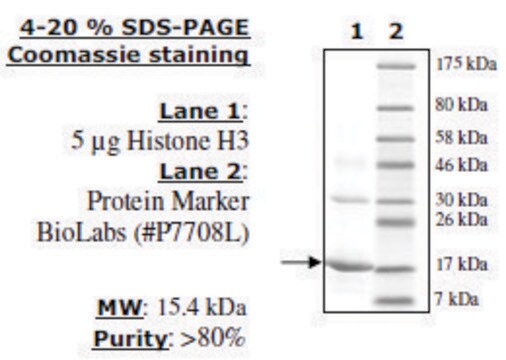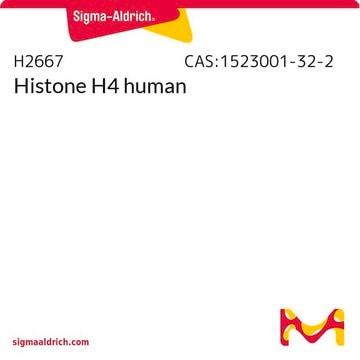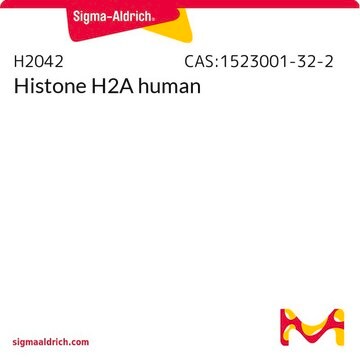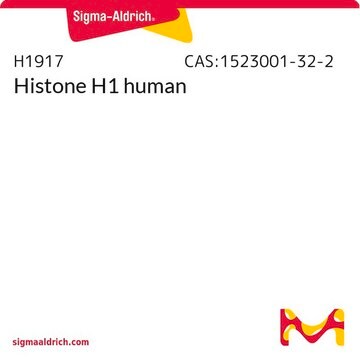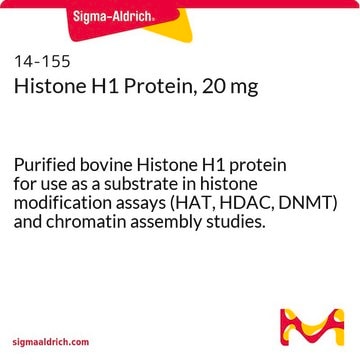Recommended Products
biological source
human
Quality Level
recombinant
expressed in E. coli
form
liquid
concentration
1 mg/mL
technique(s)
MALDI-TOF: suitable
UniProt accession no.
shipped in
wet ice
storage temp.
−20°C
Gene Information
human ... H3C1(8350)
Looking for similar products? Visit Product Comparison Guide
General description
Histone H3.1 is a histone H3 variant. It differs from H3.2 with residue 96 being a cysteine instead of serine. H3.1 is a replication-dependent histone and is a component of nucleosomes during the S-phase.
Application
Histone H3.1 human has been used in in vitro Schizosaccharomyces pombe Set7 histone methyltransferase assay for matrix-assisted laser desorption ionization-time of flight mass spectrometry (MALDI-TOF) studies.
Biochem/physiol Actions
Histone H3.1 human (H3.1) undergoes a majority of post-translational modification especially acetylation and demethylation in lysine 14 and 9 respectively. During differentiation, the levels of H3.1 transcripts decrease as cell division slows down. The incorporation of H3.1 into chromatin is mediated by a chaperone, chromatin assembly factor (CAF-1). A transversion mutation in the H3.1 may be implicated in glioma.
Physical form
Supplied as 1 mg/mL in 20 mM NaPO4, pH 7.0, 0.3 M NaCl, 1 mM EDTA, and 1 mM DTT.
Signal Word
Warning
Hazard Statements
Precautionary Statements
Hazard Classifications
Eye Irrit. 2
Storage Class Code
13 - Non Combustible Solids
WGK
WGK 3
Flash Point(F)
Not applicable
Flash Point(C)
Not applicable
Certificates of Analysis (COA)
Search for Certificates of Analysis (COA) by entering the products Lot/Batch Number. Lot and Batch Numbers can be found on a product’s label following the words ‘Lot’ or ‘Batch’.
Already Own This Product?
Find documentation for the products that you have recently purchased in the Document Library.
Sandra B Hake et al.
Proceedings of the National Academy of Sciences of the United States of America, 103(17), 6428-6435 (2006-03-31)
In the history of science, provocative but, at times, controversial ideas have been put forward to explain basic problems that confront and intrigue the scientific community. These hypotheses, although often not correct in every detail, lead to increased discussion that
Gang Wu et al.
Nature genetics, 44(3), 251-253 (2012-01-31)
To identify somatic mutations in pediatric diffuse intrinsic pontine glioma (DIPG), we performed whole-genome sequencing of DNA from seven DIPGs and matched germline tissue and targeted sequencing of an additional 43 DIPGs and 36 non-brainstem pediatric glioblastomas (non-BS-PGs). We found
Yunpeng Shen et al.
Structure (London, England : 1993), 27(4), 631-638 (2019-02-19)
Histone methylation by histone methyltransferases (HMTases) has a key role in transcriptional regulation. Discrepancies between the known HMTases and the histone lysine methylome suggest that HMTases remain to be identified. Here we report the discovery, characterization, and crystal structure of
Hideaki Tagami et al.
Cell, 116(1), 51-61 (2004-01-14)
Deposition of the major histone H3 (H3.1) is coupled to DNA synthesis during DNA replication and possibly DNA repair, whereas histone variant H3.3 serves as the replacement variant for the DNA-synthesis-independent deposition pathway. To address how histones H3.1 and H3.3
Our team of scientists has experience in all areas of research including Life Science, Material Science, Chemical Synthesis, Chromatography, Analytical and many others.
Contact Technical Service